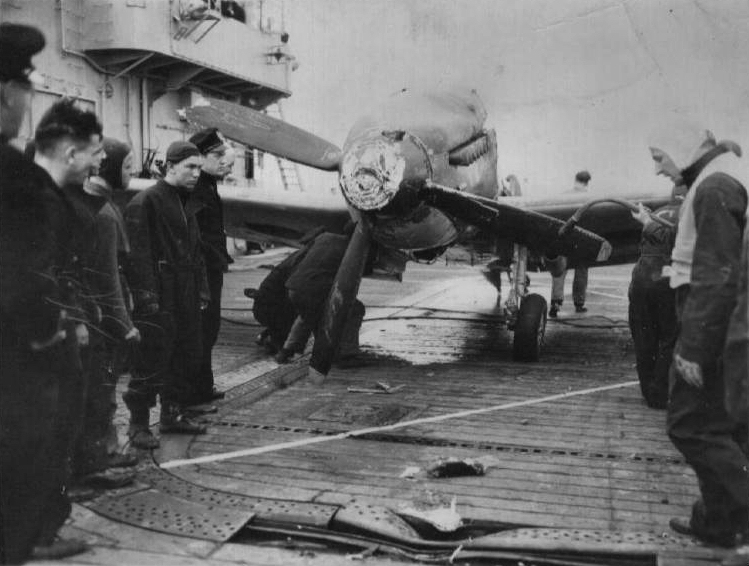|
Page 2 of 2
Deck Landing Training Continued
Barrier crashes
A steel cable barrier is raised two thirds of the way up the flight deck to
catch any aircraft that fails to snag an arrestor wire. I t was necessary
because aircraft were often parked on the forward end of the flight deck.
Being caught by the barrier was a violent and destructive event.
 |
|
‡ Catching the
last or the Oh Jesus' wire is no guarantee as this Hellcat still enters the
barrier while pulling out the no. 8 wire behind it. |
 |
|
‡ Having failed
to snag a wire the aircraft is violently pulled up when the barrier engages
the undercarriage, the nose strikes the deck and shatters the wooden
propeller blades sending deadly splinters flying in all directions. |
 |
|
‡ Having
brought the aircraft to a stop the barrier slips off the undercarriage as
the aircraft is pitched forward onto its nose - the barrier dos not always
let go so easily though and salvage parties have to clear the deck before
the barrier can be rest and the deck readied for the next aircraft to
land on. |
 |
|
The flight deck party survey the aftermath - this Seafire will be out of
action for months, its engine has been nearly ripped form its mountings and
the nose is drooping at an odd angle. |
 |
|
‡ Barracuda II,
LS691 of 768 Squadron, hitts the barrier and falls onto its nose on HMS
Ravager, off the Scottish east coast, 12 July 1944 |
Unstoppable
 |
|
Above & below: New Year's Eve 1943, Sub Lt. G.C.
Morris flying Spitfire P8537 of 761 Squadron
attempting land on HMS Ravager without a tail
wheel. After striking the barrier the aircraft
came to rest facing down the deck and suffered
distortion of the rear fuselage. |
|
 |
 |
|
Above & Below: August 10th 1944, S/Lt. J.A.
Marriott's aircraft, Spitfire Vb BL818 of 768
Squadron, clears both barriers and rolls of the
front of the flight deck to finish up in the bow
gun mounts |
|
 |
 |
|
‡ April 4th 1945
S/Lt CR Thomas flying in Seafire LR817 ‘P5H’ of 887 Squadron, attempts to
land on Ravager. He has caught the last wire while side-slipping to port;
the aircraft collides with the barrier stanchion as it falls off the edge of
the flight deck into the catwalk, still attached to the arrestor wire. |
 |
|
An unidentified Seafire ends up in the port catwalk after catching the last
wire – both barriers are in the down position so the deck was clear. You can
clearly see the double tramline of the barrier flat on the deck. |
 |
|
This unidentified Seafire has swung hard to port on take off and is about to
ditch over the side just forward of the port 40mm Bofors mount. |
 |
|
‡ October 4th
1944 Sea Hurricane NF722 has bounced over the barriers and collided with Sea
Hurricane NF728 coded 'KI-F' which was parked in the forward aircraft park.
The force of the impact has caused both aircraft to bury their noses in the
flight deck. |
 |
|
‡ Flight deck
crews inspect the wrecks prior to beginning the salvage operation |
 |
|
‡ NF722 has been extricated from
the tangle leaving NF728 sat in a precarious position. Note the port 40mm
Bofors mount is under covers |
 |
|
Fulmar DR726 of 768 squadron, flown by S/Lt. I.C. Faulconer, after tangling
with the barrier during a night deck landing on February 23rd 1944 |
A close call
 |
|
‡ This dramatic shot shows
a Seafire breaking hard to port just before it crosses the round down in
order to go around again.
|
Write offs
|
 |
|
Above & Below: A Spitfire hangs precariously
over the quarter deck having smashed into the
round down and suffering major damage including
having its engine ripped from its mountings. It
was finally jettisoned overboard. |
|
 |
Aircraft handling
 |
|
Seafire with its wings folded going down into the hanger |
 |
|
Hellcat FN371 'N' of 768 squadron coming up out of the hanger |
 |
|
A mixed bag of aircraft types on Ravager's flight deck alongside the jetty.
Note both 'A' frame hoists are rigged on the aft end of the flight
deck - these were used to load stores and were capable of lifting aircraft
to and from the jetty or a lighter alongside. |
Ferry duty
 |
|
November 11th 1944 RAVAGER on passage from Norfolk Navy Yard to New
York with a ferry load of Corsairs and Hellcats. |
Image marked ‡ are
from the private collection of Mrs Rona Holmes, Rona's
father
JX/62602H Able Seaman
Gordon Christie served aboard HMS Ravager from December 1943
till January 1946
Unless stated
otherwise all other images are from the Royal Navy Research
Archive collection
Page last edited:
10 May 2024
|